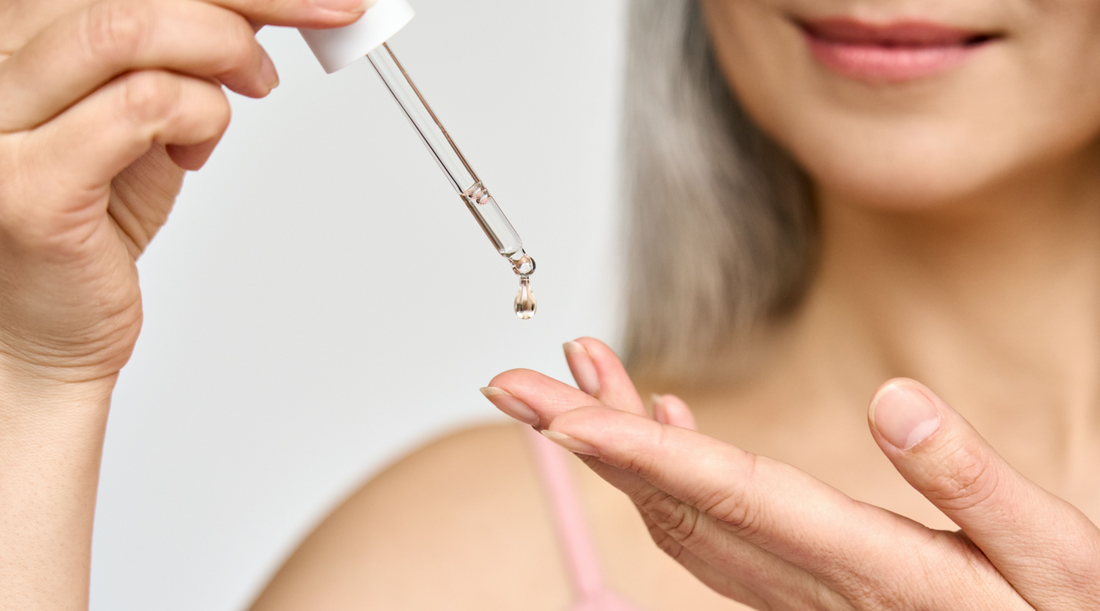
Beyond the Hype: Understanding Hyaluronic Acid in Skincare
Share
I’ve been doing A LOT of research over the past few months into a skin care ingredient that seems to be on in every product and on everyone’s lips, Hyaluronic Acid. So does this ingredient really live up to all the buzz?
Buckle up because this is going to be a long one!
In the ever-evolving world of skincare, hyaluronic acid (HA) has become a beacon for those chasing dewy, hydrated skin. It's found its way into countless serums, moisturizers, and even injectable fillers. While HA certainly offers a range of benefits, it's crucial to understand its limitations and the science behind it, rather than merely following the social media hype.

What is Hyaluronic Acid?
Hyaluronic acid is a naturally occurring polysaccharide found throughout our bodies. It plays a pivotal role in keeping our skin hydrated by retaining water—up to 1,000 times its weight, in fact[1]. As we age, our skin's natural HA levels decline, leading to drier skin and the formation of wrinkles[3].
HA is found in various parts of the body, not just in the skin:
Connective TissuesOne of the primary locations of HA in the body is within connective tissues. It plays a crucial role in cushioning and lubricating joints and tendons.
EyesHA is found in significant quantities in the eyes, particularly in the vitreous humor, the clear gel-like substance that fills the space between the lens and the retina. It helps maintain the shape of the eyeball and acts as a shock absorber for the retina.
SkinIn the skin, HA is present in the dermis, the layer beneath the epidermis (the outermost layer of the skin). The dermis is composed of connective tissue and is rich in collagen and elastin fibers, where HA provides moisture, plumpness, firmness, and suppleness to the skin.
Synovial FluidHA is also a component of synovial fluid, the viscous fluid that fills the cavities of synovial joints. It serves as a lubricant and shock absorber, allowing bones to move smoothly over each other.
Other AreasBeyond these, HA is distributed throughout the body in smaller quantities in various tissues and fluids, playing roles in hydration, nutrient distribution, and tissue repair and regeneration.
What are some of the benefits of HA in skincare?
- Moisturizing: At its core, HA's primary function is to retain water, ensuring the skin remains hydrated. Dr. Sherene Idriss, a prominent dermatologist, has noted that hydrated skin can help appear more radiant and youthful[2].
- Anti-aging: As we age, our skin's natural hyaluronic acid levels decline. This results in the skin becoming drier and less elastic, leading to the formation of wrinkles. Topical HA products aim to replenish some of this lost HA, thereby reducing the appearance of fine lines[3].
- Wound Healing: Some studies suggest that hyaluronic acid can help in the wound healing process. It's believed to regulate inflammation levels and signal the body to build more blood vessels in the damaged area[4].
Does HA in skin care products actually work?
The widespread presence of HA in the body underscores its importance in numerous biological functions, from joint lubrication to skin hydration. This versatility is one reason why HA has become such a valued ingredient in skincare, as it mimics the natural hydrating and repairing functions of the HA found within our bodies. However, as noted in skincare applications, the molecular size of HA determines how effectively it can penetrate and benefit the skin, particularly when applied topically.
A common point of contention regarding topical hyaluronic acid products is the molecule's size. Pure hyaluronic acid has a high molecular weight, which makes it too large to penetrate the epidermis or the topmost layer of the skin. So, how can it offer the myriad of benefits that many products promise?
- Surface Hydration: Even if it doesn't penetrate deeply, high molecular weight HA can still benefit the skin by drawing moisture to the surface. This creates a hydrating and plumping effect, which can make the skin look fresher and smoother[5].
- Low Molecular Weight HA: Advances in cosmetic science have led to the development of lower molecular weight hyaluronic acid, which can penetrate the skin more effectively than its high molecular weight counterpart. This smaller HA can provide deeper hydration and has been found to have potential anti-inflammatory and regenerative properties[6].
- Formulation Matters: Many skincare products containing HA are formulated in conjunction with other ingredients that can help enhance its absorption and efficacy. Ingredients such as peptides, ceramides, and certain botanicals might support HA's benefits for the skin[7].
However, it's essential to note that while lower molecular weight HA can penetrate deeper, there are some studies suggesting that it might potentially induce skin inflammation. Therefore, always consult with a dermatologist to determine the best product and molecular weight suitable for your skin[8].
What are some notable HA skin care products?
The Ordinary - Hyaluronic Acid 2% + B5
This popular serum combines low, medium, and high molecular weight hyaluronic acid, offering multi-depth hydration.
La Roche-Posay - Hyalu B5 Hyaluronic Acid Serum
This serum is known for its combination of hyaluronic acid, including LMW-HA, and vitamin B5. It's designed to provide both surface hydration and deeper skin hydration. You can also earn cash back by shopping La Roche Posay through the Rakuten site or app
SkinCeuticals - Hyaluronic Acid Intensifier (H.A. Intensifier)
This corrective serum combines low molecular weight HA with other active ingredients to amplify skin's hyaluronic acid levels. SkinCeuticals is also offering 9% cash back today by shopping their site through the Rakuten site or app
Budget friendly options:
Neutrogena Hydro Boost Water Gel
Neutrogena's Hydro Boost line focuses on hydration, and the Water Gel contains hyaluronic acid to quench skin. Another opportunity to earn cash back today by shopping their site through the Rakuten site or app.
COSRX Hyaluronic Acid Hydra Power Essence
COSRX, a Korean skincare brand, offers this essence with hyaluronic acid to deeply hydrate the skin.
Dr C. Tuna Aqua Boosting Hydra Drops
These powerful drops contain the latest innovation in skin moisturization PatcH2O. PatcH2O offers optimal hydration by acting at two levels. On the surface of the skin, the novel and unique combination of hyaluronic acid, alginate and a natural glucan known as pullulan, forms a molecular mesh, like a protective film reducing water evaporation. This micro-network is loaded with a moisturizing complex, which is gradually released into the heart of the stratum corneum to rebalance the optimal skin moisture level.
Rethinking the HA Hype
At the end of the day, Hyaluronic acid, while beneficial, isn't a one-size-fits-all ingredient. It's crucial for consumers to educate themselves about its properties and potential benefits, focusing on product formulations rather than marketing buzz and always consult a skin-care expert or perform a patch test when trying a new to you product.
**References**
[1]: Papakonstantinou, E., Roth, M., & Karakiulakis, G. (2012). Hyaluronic acid: A key molecule in skin aging. *Dermato-Endocrinology, 4*(3), 253–258.
[2]: Idriss, S. (2020). The magic of hyaluronic acid in skincare. [Interview]. Dermatology Times.
[3]: Pavicic, T., et al. (2011). Efficacy of cream-based novel formulations of hyaluronic acid of different molecular weights in anti-wrinkle treatment. *Journal of Drugs in Dermatology, 10*(9), 990-1000.
[4]: Chen, W. Y., & Abatangelo, G. (1999). Functions of hyaluronan in wound repair. *Wound Repair and Regeneration, 7*(2), 79-89.
[5]: Held, M. (2005). Hyaluronic acid in skin: Aspects of aging and its pharmacologic modulation. *Clinics in Dermatology, 23*(2), 106-122.
[6]: Stern, R., & Maibach, H. I. (2008). Hyaluronan in skin: aspects of aging and its pharmacologic modulation. *Clinics in Dermatology, 26*(2), 106-122.
[7]: Jegasothy, S. M., et al. (2014). Efficacy of a New Topical Nano-hyaluronic Acid in Humans. *The Journal of Clinical and Aesthetic Dermatology, 7*(3), 27–29.
